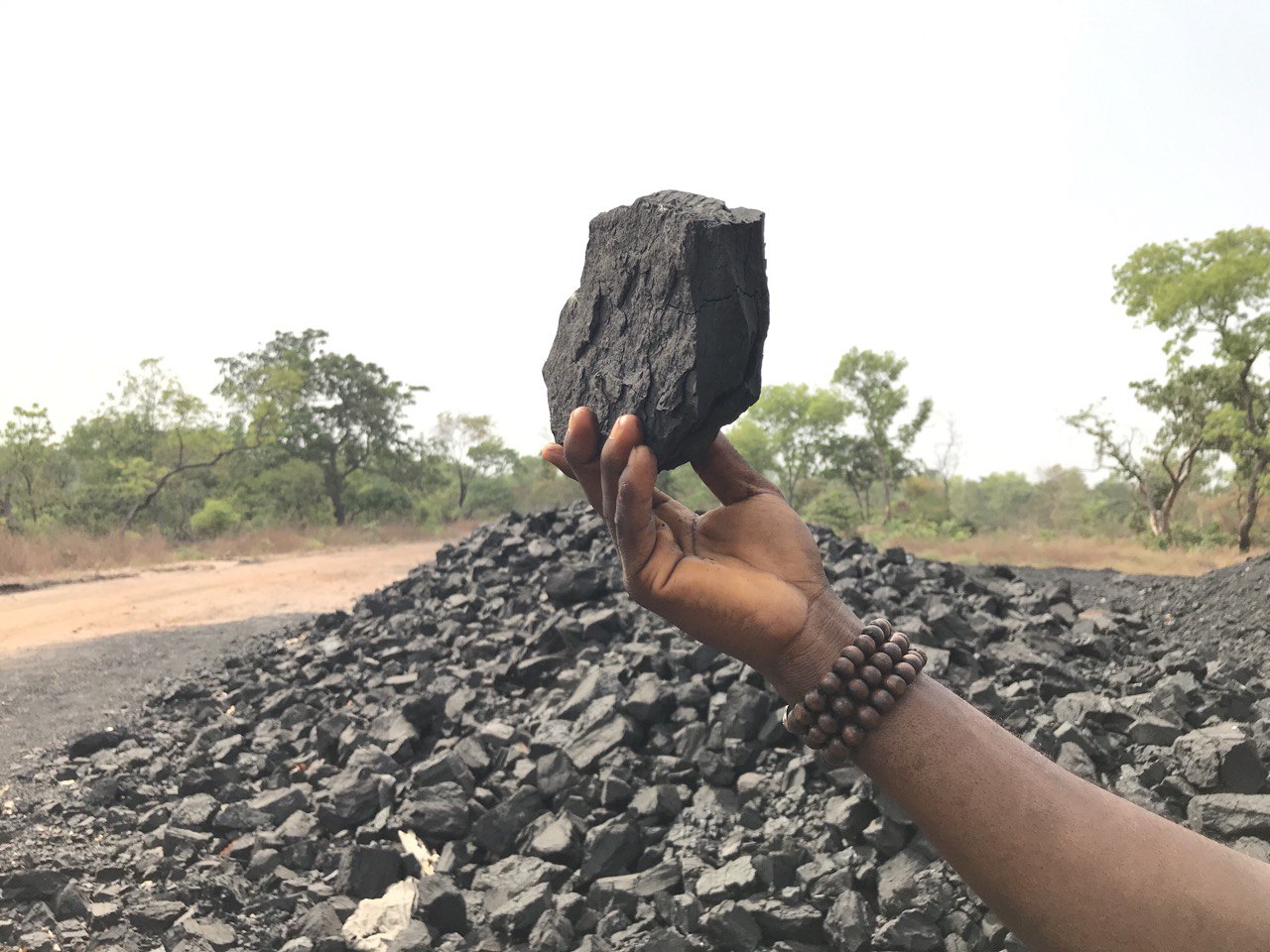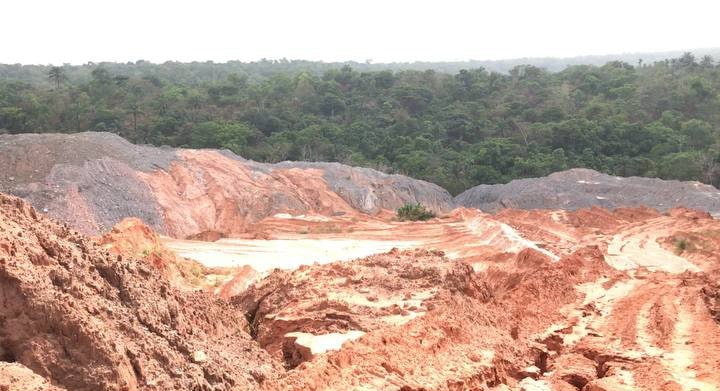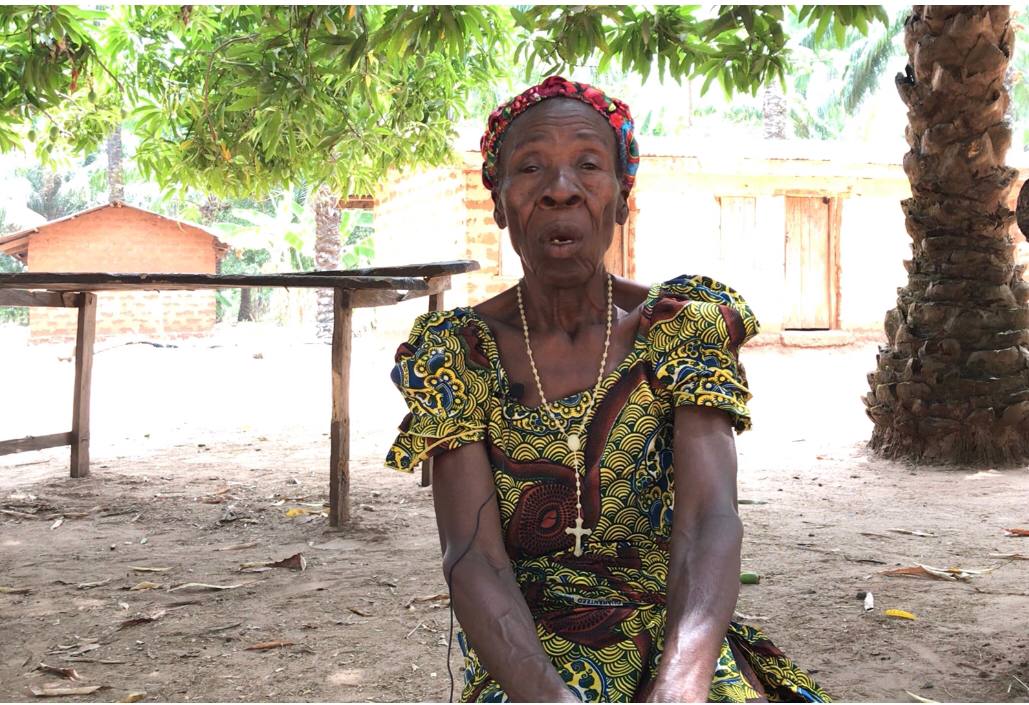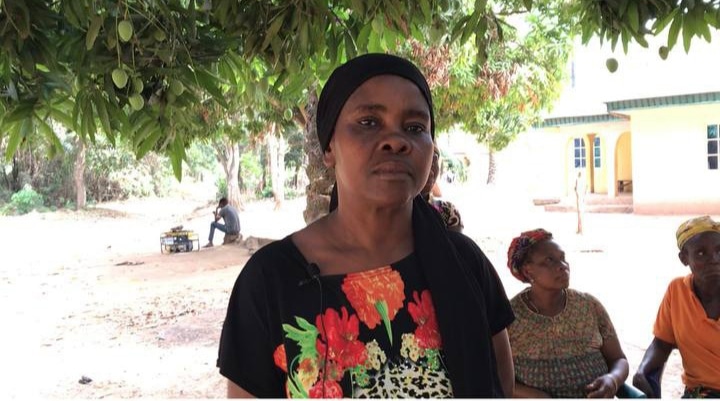It was early on a Monday morning when I visited the Ibagwa community in the Owukpa area of Nigeria’s north-central Benue. Owukpa is a coal-rich area of the state with active mining activities in different communities.
Ibagwa is one of those communities. Owukpa Consolidated Mines Nigeria Limited, a coal exploration, development, and mining company established in 2003, has been operating in the community since 2007. But in the past year, things changed as the company, which has been mining coal for over a decade in the community, downed tools and fled.

A coal dump in Owukpa, Benue, Nigeria. Photo credit: Vivian Chime
Julie Okoh, a community member and a climate activist, was instrumental in the company’s sudden exit from the community. In 2014, Okoh began creating awareness using social media on the land degradation and health challenges experienced in her community due to coal mining.
“Coal mining became a doom, not a blessing, to my community because there is no drinking water, there is no hospital, the children are suffering deformity and malnourishment, infertility became a norm. So I rose up against it,” Okoh said.
Another reason why Okoh stood against the miners is because she knows that “climate change is real, environmental degradation by exploration of fossil fuels is real,” and her community is experiencing its devastating impacts.
Before the company’s exit, protests in the community gathered momentum such that protesters began getting arrested and harassed. This led to the arrest of Okwori Onaji, another environmental activist from the area, in July 2020.
At this point, Okoh decided that more needed to be done to forcefully stop the miners from entering the community. In August 2020, she mobilised women in her community to rise against the activities of the miners.
Failed promises fuel women’s resistance
To this effect, the women began meeting weekly to devise means of sending the coal miners out of their community. Part of their agitations was that the coal mining company had promised the community basic amenities like water, schools, and healthcare centers but never stayed true to their promise. And yet, the community is made to suffer the consequences of the mining.
The company’s website clearly stated its core values: valuing lives and the well-being of indigenes in the area of operation and the development of the society it operates in. But none of this is true for Owukpa.

Coal mining waste in Owukpa, Benue, Nigeria. Photo credit: Vivian Chime
The road leading to Owukpa remains untarred, sloppy, and littered with gullies. The vegetation on both sides of the road can be seen to be dying off, and farmers can no longer go to farm due to degraded and unproductive lands. And despite its safety policy, Owukpa Consolidated Mines Nigeria Limited located its mining site a stone’s throw away from the only secondary school in the community. This led to physical cracks on the school walls and the breaking down of the school buildings.
“This is the only secondary school that this community has, but this is where they [the coal company] deposit and load their coal,” Okoh said.
“This is where our children read, they read amongst coal, they eat coal, they drink coal, they read coal, because when you are in school, debris fall as they are blasting, the sound from the mines is so devastating. The vibration shakes down the walls.”
She said the unkept promises were the major reasons for the community’s resistance because the coal mining company “kept saying we will do it, we will do it. So in 2020, we said if you are not doing it, please leave.”

Maria Onoja. Photo credit: Vivian Chime
Adding to what Okoh said, Maria Onoja, a woman in her early 80s and the mother of the village chief, said the women blocked the roads and sent away the miners because they could no longer bear the polluted water, degraded farmlands, and illnesses that the community suffered as a result.
“We blocked the roads to prevent further coal mining because we are dying due to pollution from the coal mining activities,” Onoja said.
“Our health is threatened. There is no water, our roads are completely eroded. We cannot transport our farm produce to the market due to the terrible state of the road. We and our children have become prone to illnesses due to the mining activities.”
Women invoke deity against the coal mining company
As protests by the women continued for 14 days nonstop, from morning to night, both young and old women also began receiving threats of arrest if they did not end the resistance.
Rose Idoko, a farmer, recalls how during the protest, “they wanted to fight us, they said they would call the police for us, they threatened to do all sorts, but we did not fear because this is our land. No police will come and arrest us for something that is happening in our community.”
Meanwhile, Okoh said the major backup which gave the women courage to continue the resistance was the community deity. Amid the threats, the women invoked Ibagwa’s deity of justice, an age-long local gong called Ekwanya, which sits in the community’s shrine and is respected by community members for its power to bring death on anyone perverting justice.
“Even those supporting the miners, as soon as they heard we had invoked the deity, they took off their hands. Because the deity does not come out ordinarily, the women brought out the priestess of the deity to make proclamations, and it worked for us.”
It has been over a year since the women invoked the deity that caused the coal miners to abandon their tools and flee the community. Okoh said the diety’s curse is still in place, and that is why “up until now, we have not seen them.”
How long can communities sustain resistance?
However, for someone like Idoko, she said the women will continue to stop the coal miners from entering the community until “they give us roads, hospitals, water, electricity, and school because we need our children to be educated.”
“We need them to help us because as we are now in the village, we do not have anything to do because the farmlands are no longer productive. Our cassava and other crops get rotten yearly when we cultivate. So we don’t have anything to do.”

Rose Idoko. Photo credit: Vivian Chime
But Okoh is worried because, according to her, in as much as she understands the climatic impacts of coal mining and would rather it ends in her community, she doubts if the resistance can go on for long if the people are not empowered. She said she fears that they might succumb if the coal mining company eventually meets the community demands.
“The ability to stand for resistance is when there is help. If there is no help, you can’t sustain resistance,” she said. “If I say don’t take coal, I must bring something to sustain my resistance, and when I am poor, you give me anything, after a while, I won’t be able to sustain resistance. “So, I am asking, whatever we need to do, we need to do it. We must sustain the people, we must empower the people. A people that is not empowered can be enticed with bait.”
Mike Terungwa, team lead at Global Initiative for Food Security and Ecosystem Preservation (GIFSEP), said this is one major challenge facing climate action in communities. He said the government needs to provide basic amenities for communities to adapt, adding that civil society organisations also need to stand up to the challenge.
“The government needs to provide basic amenities, not just to the fossil fuel dependent communities or the host communities but to everyone around the world.”
“No more coal mining in Ibagwa!”
The stories of Owukpa indigenes are not far-fetched from what is happening in coal mining communities around the world.
Coal is the dirtiest fossil fuel because it is the most-carbon intensive when burnt, worsening the global climate crisis. Its terrible impacts on the health of people and the environment were the reason countries committed to coal phase-out at the 2021 COP26 in Glasgow. But this decision was compromised at the last minute from phase-out to phase down.
In 2020, developed countries failed to meet their pledge of providing developing countries with $100 billion per year to support climate action. At the last COP, the countries said the finance would be available in 2023 instead.
As countries prepare to attend COP27 in Egypt, people like Okoh and the women in her community seek help for their people’s survival. This way, they would be able to withstand and not permit coal mining activities. But for now, the women of Ibagwa in Owukpa, in solidarity, still maintain their stand that there would be “no more coal mining in Ibagwa!”
